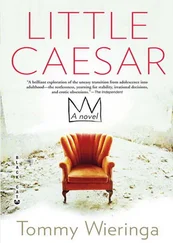Regina showed him off in public and seemed to glow softly in his presence.
‘Nubians are a very handsome people,’ she said. ‘The handsomest in Egypt, they say. But as handsome as Mahfouz. .’
‘Right, Mom,’ India said, ‘we got you. Take it easy.’
Regina took her husband to the city: he returned with a linen suit and handmade leather shoes. He moved as easily in them as he had in the Indian off-the-rack goods he’d arrived in. Because he was in the habit of waxing his moustache, and because Regina dressed him as a tropical dandy, he was something of an anachronism in Lomark, a man lost in some strange corner of the world.
The first time Mahfouz Husseini saw me he leaned over and looked me deep in the eye, to see if I had all my marbles. I didn’t try to stop him. When he’d had a good look, Husseini straightened up and laughed; apparently he’d seen something there. Then he said a few words in Arabic and moved around to the back of my cart. Hey, tenthead! Let go, I need to train that arm! I’m not your old auntie! But he seized the handles without asking and started pushing me around the village exactly like an old lady. I was embarrassed. It was all a bit too much. I sat in my chair glowering, with no idea where he was taking me. In one fell swoop he had shattered my carefully cultivated isolation. People were looking at us. At the dinner table that night they’d say, ‘Did you know Frankie Hermans has a nurse with a moustache?’ We looked like jerks together, Husseini and I.
But unless I was mistaken, we were heading for the Lange Nek. The Arab hummed little snatches of some tune and was really putting them down, his soles creaked on the asphalt. I could smell the river from a long way off, the water had a smell I couldn’t describe but that made me calm down. Maybe it was all the impressions he’d undergone on his way here.
‘There is Piet,’ Husseini said.
The water had gone down again, Piet Honing’s ferry service was running as usual. The boat was in midstream and coming our way. Piet was tearing off ticket stubs and handing them in through open car windows; the change he received in return went into the pouch around his waist. Then he went into the pilothouse and reversed the engines. Two cars and a cyclist came on shore. I didn’t look at them. Piet came over to us.
‘So, buddy, I haven’t seen you for a while.’
I grunted.
‘Lots has happened, nothing’s changed — you know what they say. Had some damage this winter, though, the river took a whole bunch with it. But we’re back in business, aren’t we, Mahfouz? Am I right?’
He gave Mahfouz a shy little slap on the shoulder and went back on board. Mahfouz pushed me to the edge of the quay, I pulled hard on the brakes. The Arab squatted down, the elbow of his left arm resting on his knee, the fingers of the other hand plucking at his moustache.
From that day on, Mahfouz and I sat together pretty often at the Ferry Head. I enjoyed having him around; he would talk and I would listen. Whenever Piet was having mechanical problems, Mahfouz jumped right in the thick of it. At his father’s shipyard in El-Biara, a little place just outside Kom Ombo, he had learned how to take apart an engine and put it back together again. He was the youngest of six brothers and three sisters. His father owned a yard on the banks of the Nile, and at a bend in that river Mahfouz had learned how to build a felucca, the characteristic ship of the Nile. His father had groomed him to work in the family business, but with so many siblings Mahfouz decided to seek his fortune in the tourist industry instead. Far from home, in the village of Nuweiba on the east coast of the Sinai, he had opened a little shop fifty metres from the beach. He sold rugs, Bedouin silver and pharaonic statuettes that could pass for antique if the buyer was blind and retarded; because so many tourists met those criteria, business was brisk. His shop was in a long row of others selling exactly the same items. Above the door was the print of a hand in dried goat’s blood: the hand of Fatima, devout daughter of the Prophet. Each morning Mahfouz hung the rugs and cotton clothing outside his shop, and flapped the dust off them each evening.
Nuweiba consisted of three loosely connected districts: most tourists went to Tarabin, a burgeoning strip along the beach full of hotels, restaurants and shops. A few kilometres to the south lay Nuweiba Port, where the ferries left for Jordan. In Tarabin Mahfouz had led an uneventful life. He slept about ten hours a day and spent the rest of the time in his shop or with friends. They played backgammon beneath the fluorescent lights, a waiter from the nearby restaurant brought them countless trays of tea.
Husseini felt strong, and believed that his diet of fish and rice and the sea air he breathed improved his blood. In his opinion, a person’s soul was in the blood. Blood travelled all around the body and infused with spirit the framework of flesh and bones that called itself Mahfouz Husseini.
Sometimes he would fall asleep in a beach chair and wake the next morning just as the sun rose above the mountains on the far shore. He lived with his face to the sea and his back to the desert, free of the great desires that make life a living hell. After someone told him that the Sinai was sliding away from the Arab Peninsula across the way at the rate of a centimetre and a half each year, he thought he could see the distance widening.
The day a bus from Piramid Tours came rolling into Nuweiba, he was sitting in his armchair outside the shop. Later that afternoon the first tourists from this new bunch appeared in his street: three women. Dutch. Mahfouz could tell right away. It was possible at times to mistake Dutch people for Germans, but the latter tended to have a kind of belaboured modesty, as though they could be arrested any minute. Germans also did talk louder than the Dutch, it’s true, but they didn’t walk around as though the world belonged to them. Dutch people moved with a heavily self-confident tread, as though they knew their way everywhere.
Mahfouz’s colleague, Monsef Adel Aziz, shouted, ‘Lookie-lookie-no-obigation’ at the women, the sign for the others to approach them as well, rubbing their hands and preening their feathers. Mahfouz saw a tired smile cross the face of the youngest woman. One of the older women, he could tell, had come to his country in search of physical love; one developed an eye for such things. Women like that had something hungry in their gaze, something insatiable. More and more of them had started coming each year; sometimes you saw white grandmothers with amazing lavender hair walking hand in hand with young boys. The story had it that these women had been abandoned by their husbands in their own country, or that they had come to Egypt because their husband was ill and could no longer fulfil his conjugal obligations. Monsef Adel Aziz consorted with such women and was none the poorer for it. The young men of the village didn’t care whether the women were old, young, fat or pretty. Mahfouz himself had had an affair with an American woman; when her vacation was over she had asked him to go home with her, but in his eyes a house in Iowa was no better than a shop in Nuweiba. Catherine O’Day had therefore started spending a few weeks each year in Nuweiba. It had been a few years, however, since he’d seen her. He’d received a postcard from her once, with greetings from America. The postcard hung on the back wall of Husseini’s shop, half covering a photo of him with his arm around the popular actress Athar el-Hakim, who had once come to Nuweiba for a day to shoot some scenes on the beach.
The women were coming toward his shop. Concerning the oldest, the one Mahfouz had recognized as sexually needy, he heard later that week that she had started a torrid affair with a bellboy at the Hotel Domina; an attractive young man who, in response to her elaborate praise for the ease with which he had carried her luggage, had immediately dropped his trousers to show his sizeable dong. Mahfouz took a good look at the youngest of the three — there was shadow around her. He felt the need to comfort her.
Читать дальше












